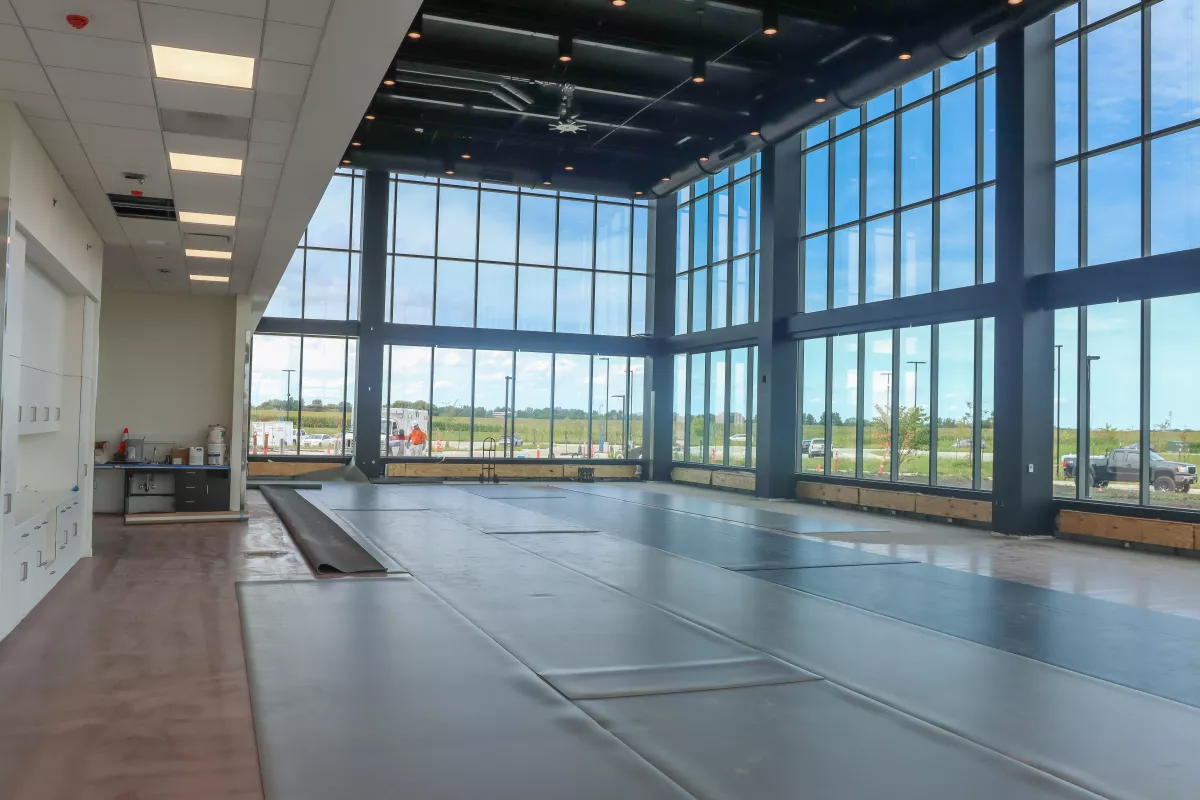Q&A with Brad Haws: North Liberty campus leadership, planning updates, and more

With the North Liberty campus set to open in less than a year, an increasing number of key decisions are being finalized. We spoke with Brad Haws, MBA, chief executive officer of the clinical enterprise and associate vice president of UI Health Care, to get the latest updates.
As construction progresses on the North Liberty campus, new details are being shared about its patient-centered design, service lines, and features. Can you share more about the leadership team for the new campus upon its opening?
Just as construction is coming together, we are also focusing on the important details of the administration and operation of the North Liberty campus.
In her hospital administration role, Amy O’Deen, BSN, MHA, has been instrumental in the strategic planning, operational management, and financial leadership for the North Liberty campus. She will serve as chief administrative officer for the new campus, working in partnership with many stakeholders across the organization. Given Amy’s more than 40 years of experience at UI Health Care, and her heavy involvement during all phases of the North Liberty project, she will provide a steady hand in leading the opening of our newest campus.
As you may have already heard, Emily Ward, DNP, MBA, RN, NEA-BC, CCRN, will serve as associate chief nursing officer (ACNO) for the North Liberty campus. As a nurse at UI Health Care for 17 years, she’s held a variety of staff and leadership positions, and she currently serves as the ACNO for the Adult Inpatient Divisions at university campus. While she’s already a co-leader of clinical planning for North Liberty campus, beginning Nov. 1, her focus will fully shift to the new campus, and her current position will be backfilled.
Larry Marsh, MD, chairman of the Department of Orthopedics and Rehabilitation, has played a pivotal role in the North Liberty campus planning and will continue to lead efforts as construction and future operations progress. Once more operational details are finalized, we will actively recruit additional physician leaders in the coming months.
Have any lessons from the downtown campus transition earlier this year been applied to the planning and opening of the North Liberty campus?
Yes—absolutely. When our long-term facilities master plan was created, downtown campus was not on our radar. Now, starting next year, we will have three campuses where our patients can receive inpatient care and emergency services. As Vice President Jamieson has talked about, this is exciting as we become a system of care and see opportunities to increase access to health care for Iowans. Our teams deserve huge kudos for the work they’ve done so far, including efforts to centralize inpatient bed availability and improve resource allocation.
The new North Liberty campus was designed years ago to allow us to relocate transformative complex care to a new location, while also creating space in our Emergency Department, operating rooms, inpatient units, clinics, and academic areas on university campus. For the most part, our plans for North Liberty remain largely unchanged with the addition of the downtown campus. The first phase of North Liberty will offer emergency care, as well as the relocation of many, but not all, orthopedic care services, including sports medicine, spine, total joint replacement, and other orthopedic subspecialty services. The North Liberty campus will also provide imaging, lab, pharmacy, pre-surgical evaluation, and physical therapy to all types of patients.

As we get closer to the completion of the North Liberty campus, we’re also investing in important infrastructure at the downtown and university campuses to support our teams as a system of care. This is foundational work that takes time and financial investment, and yet, the benefits are enormous as we think about care systems designed to meet specific needs of patients in the most appropriate settings.
What are the benefits for employees as we move toward three campuses?
Vice President Jamieson and I believe that overall, a system of care aims to create a more integrated, efficient, and patient-focused environment, benefiting both employees and patients alike. This approach offers employees opportunities, especially for those interested in professional development and career choices. We’re keeping this in mind as we look to recruit and staff our campuses going forward, including North Liberty.
We know that current and potential employees want varied experiences to enhance skills and knowledge; opportunities for career advancement; resources for quality care, including access to innovative tools and approaches; and strong teams that are supportive and dedicated to excellence. A system of care has the potential to offer more to employees, making it an attractive and fulfilling environment for current and future health care professionals.